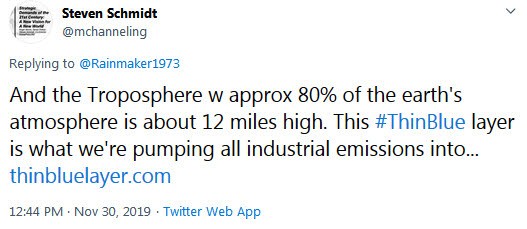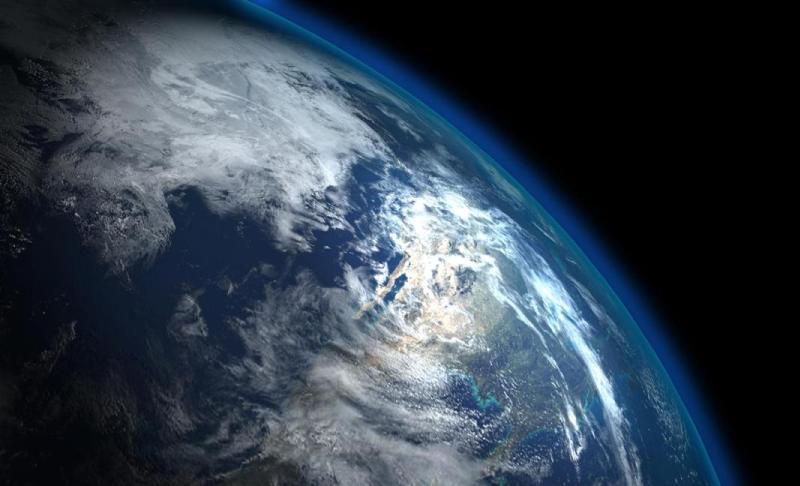File:Earthatmosphere iss23 annotated nasa.jpg: Difference between revisions
Siterunner (talk | contribs) No edit summary |
Siterunner (talk | contribs) No edit summary |
||
| (4 intermediate revisions by the same user not shown) | |||
| Line 1: | Line 1: | ||
http://en.wikipedia.org/wiki/ | * http://www.greenpolicy360.net/w/Thin_Blue_Layer | ||
:* http://en.wikipedia.org/wiki/Troposphere | |||
McGraw-Hill Concise Encyclopedia of Science & Technology (1984). Troposphere. It contains about four-fifths of the mass of the whole atmosphere. | |||
The atmosphere has a mass of about 5.15×1018 kg,[2] three quarters of which is within about 11 km (6.8 mi; 36,000 ft) of the surface. | The atmosphere has a mass of about 5.15×1018 kg,[2] three quarters of which is within about 11 km (6.8 mi; 36,000 ft) of the surface. | ||
[[Category: | |||
<small>'''Troposphere''' - https://en.wikipedia.org/wiki/Troposphere</small> | |||
:<small>'''Stratosphere''' - https://en.wikipedia.org/wiki/Stratosphere</small> | |||
::<small>'''Kármán line''' - https://en.wikipedia.org/wiki/K%C3%A1rm%C3%A1n_line</small> | |||
:::<small>'''Earth's Atmospheric Layers''' - https://www.nasa.gov/mission_pages/sunearth/science/atmosphere-layers2.html | |||
:::::[[File:Atmospheric Experiment of Humanity.jpg]] | |||
The Earth's atmosphere does not abruptly end at any given height but becomes progressively thinner with altitude. The edge of most all of the atmosphere (80% approximately in the Troposphere) is not far above us. | |||
The troposphere is one of five layers of the atmosphere surrounding the earth. The other four layers include the stratosphere, mesosphere, thermosphere, and exosphere. The troposphere is the lowest layer of the atmosphere, closest to the earth's surface. Its depth is different at different regions of the earth, being deeper in the warmer regions and shallower in the colder regions. The word 'troposphere' is derived from the Greek word 'Tropos' which means 'change'. | |||
The troposphere is located closest to the earth, followed by the stratosphere, mesosphere, thermosphere, and the exosphere. The troposphere contains approximately 80% of the mass of the atmosphere of the Earth and 99% of the total mass of Earth's atmospheric water vapor. | |||
The transitional area between the troposphere and stratosphere is called the tropopause. The jet stream or 'river of air' as it is also referred to, is located just below the tropopause and moves at approximately 250 miles per hour. The troposphere extends from the earth's surface to approximately 33,000 feet (6.2 miles) high. However in warm regions like the equator it can rise as high as 65,000 feet (12 miles). In colder regions like the north and south poles, it may rise only as high as 23,000 feet (4 miles). The troposphere is not heated directly from the sun. Instead, the sun heats the ground and the ocean and this heat is then radiated into the troposphere. | |||
Despite the fact that only a small percentage of the troposphere's gas is carbon dioxide, this is the determining factor in the earth's temperature... | |||
::[[File:Acting on Climate Change.png]] | |||
[[File:Thin Blue difference - approx 12 miles high.jpg]] | |||
[[File:'Thin Blue Layer' of Earth's Atmosphere 2.jpg]] | |||
[[Category:Anthropocene]] | |||
[[Category:Climate Change]] | |||
[[Category:Climate Policy]] | |||
[[Category:Earth Observations]] | [[Category:Earth Observations]] | ||
[[Category:Earth Science from Space]] | |||
[[Category:Global Warming]] | |||
[[Category:Green Graphics]] | [[Category:Green Graphics]] | ||
[[Category:Planet Citizens, Planet Scientists]] | |||
[[Category:ThinBlueLayer]] | |||
[[Category:Whole Earth]] | |||
Latest revision as of 17:28, 11 July 2021
McGraw-Hill Concise Encyclopedia of Science & Technology (1984). Troposphere. It contains about four-fifths of the mass of the whole atmosphere.
The atmosphere has a mass of about 5.15×1018 kg,[2] three quarters of which is within about 11 km (6.8 mi; 36,000 ft) of the surface.
Troposphere - https://en.wikipedia.org/wiki/Troposphere
- Stratosphere - https://en.wikipedia.org/wiki/Stratosphere
- Kármán line - https://en.wikipedia.org/wiki/K%C3%A1rm%C3%A1n_line
- Earth's Atmospheric Layers - https://www.nasa.gov/mission_pages/sunearth/science/atmosphere-layers2.html
The Earth's atmosphere does not abruptly end at any given height but becomes progressively thinner with altitude. The edge of most all of the atmosphere (80% approximately in the Troposphere) is not far above us.
The troposphere is one of five layers of the atmosphere surrounding the earth. The other four layers include the stratosphere, mesosphere, thermosphere, and exosphere. The troposphere is the lowest layer of the atmosphere, closest to the earth's surface. Its depth is different at different regions of the earth, being deeper in the warmer regions and shallower in the colder regions. The word 'troposphere' is derived from the Greek word 'Tropos' which means 'change'.
The troposphere is located closest to the earth, followed by the stratosphere, mesosphere, thermosphere, and the exosphere. The troposphere contains approximately 80% of the mass of the atmosphere of the Earth and 99% of the total mass of Earth's atmospheric water vapor.
The transitional area between the troposphere and stratosphere is called the tropopause. The jet stream or 'river of air' as it is also referred to, is located just below the tropopause and moves at approximately 250 miles per hour. The troposphere extends from the earth's surface to approximately 33,000 feet (6.2 miles) high. However in warm regions like the equator it can rise as high as 65,000 feet (12 miles). In colder regions like the north and south poles, it may rise only as high as 23,000 feet (4 miles). The troposphere is not heated directly from the sun. Instead, the sun heats the ground and the ocean and this heat is then radiated into the troposphere.
Despite the fact that only a small percentage of the troposphere's gas is carbon dioxide, this is the determining factor in the earth's temperature...
File history
Click on a date/time to view the file as it appeared at that time.
| Date/Time | Thumbnail | Dimensions | User | Comment | |
|---|---|---|---|---|---|
| current | 11:11, 10 December 2014 |  | 657 × 329 (24 KB) | Siterunner (talk | contribs) | Category:Green Graphics |
You cannot overwrite this file.
File usage
The following 4 pages use this file:



